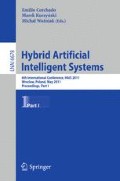Abstract
This paper presents a novel approach to building sample classifiers based on microarray gene expression studies. This approach differs from standard methods in the way features are selected. Standard methods focus on features (genes) with most differential expression between classes of samples compared, while the proposed approach takes into account apriori domain knowledge of relationships between features, available e.g., in the form of pathway or gene-ontology databases. Features for classification are then selected on the basis of activation of pathways (gene sets) rather than mutually unrelated genes with very high individual predictive power. Performance of the proposed method is illustrated on the basis of sample microarray studies.
Access this chapter
Tax calculation will be finalised at checkout
Purchases are for personal use only
Preview
Unable to display preview. Download preview PDF.
References
Adewale, A.J., et al.: Pathway analysis of microarray data via regression. J. Comput. Biol. 15(3), 269–277 (2008)
Allison, D.B., et al.: Microarray data analysis: from disarray to consolidation and consensus. Nature Reviews Genetics 7, 55–65 (2006)
Chiaretti, S., Li, X., Gentleman, R., et al.: Gene expression profile of adult T-cell acute lymphocytic leukemia identifies distinct subsets of patients with different response to therapy and survical. Blood 103, 2771–2778 (2004)
Derrac, J., García, S., Herrera, F.: A First Study on the Use of Coevolutionary Algorithms for Instance and Feature Selection. In: Corchado, E., Wu, X., Oja, E., Herrero, Á., Baruque, B. (eds.) HAIS 2009. LNCS, vol. 5572, pp. 557–564. Springer, Heidelberg (2009)
Dinu, I., et al.: Gene-set analysis and reduction. Briefings in Bioinformatics 10(1), 24–34 (2008)
Dudoit, S., Fridlyand, J., Speed, P.: Comparison of discriminant methods for classification of tumors using gene expression data. Journal of American Statistical Association 192, 77–87 (2005)
Efron, B., Tibshirani, R.: On testing the significance of sets of genes. Ann. Appl. Stat. 1(1), 107–129 (2007)
Glas, A.M., et al.: Converting a breast cancer microarray signature into a high-throughput diagnostic test. BMC Genomics 7, 278 (2006)
Goemann, J.J., et al.: A global test for groups of genes: testing association with a clinical outcome. Bioinformatics 20(1), 93–99 (2004)
Goeman, J.J., Buehlmann, P.: Analyzing gene expression data in terms on gene sets: methodological issues. Bioinformatics 23(8), 980–987 (2007)
Khan, J. et al.: Classification and diagnostic prediction of cancers using gene expression profiling and artificial neural networks. Nature Med. 7, 673–679 (2001)
Lin, Y.H., et al.: Multiple gene expression classifiers from different array platforms predict poor prognosis of colorectal cancer. Clin. Cancer Res. 13, 498–507 (2007)
Maciejewski, H.: Quality of feature selection based on microarray gene expression data. In: Bubak, M., van Albada, G.D., Dongarra, J., Sloot, P.M.A. (eds.) ICCS 2008, Part III. LNCS, vol. 5103, pp. 140–147. Springer, Heidelberg (2008)
Maciejewski, H., Twaróg, P.: Model instability in microarray gene expression class prediction studies. In: Moreno-Díaz, R., Pichler, F., Quesada-Arencibia, A. (eds.) EUROCAST 2009. LNCS, vol. 5717, pp. 745–752. Springer, Heidelberg (2009)
Markowetz, F., Spang, R.: Molecular diagnosis. Classification, Model Selection and Performance Evaluation, Methods Inf. Med. 44, 438–443 (2005)
Mootha, V.K. et al.: PGC-1 alpha-repsonsive genes involved in oxidative phoshporylation are coordinately downregulated in human diabetes. Nature Genetics 34(3), 267–273 (2003)
Subramanian, A., et al.: Gene set enrichment analysis: A knowledge-based approach for interpreting genome-wide expression profiles. Proc. Natl. Acad. Sci. USA 102(43), 15545–15550 (2005)
Wozniak, M., Zmyslony, M.: Designing Fusers on the Basis of Discriminants – Evolutionary and Neural Methods of Training. In: Graña Romay, M., Corchado, E., Garcia Sebastian, M.T. (eds.) HAIS 2010. LNCS, vol. 6076, pp. 590–597. Springer, Heidelberg (2010)
Author information
Authors and Affiliations
Editor information
Editors and Affiliations
Rights and permissions
Copyright information
© 2011 Springer-Verlag Berlin Heidelberg
About this paper
Cite this paper
Maciejewski, H. (2011). Class Prediction in Microarray Studies Based on Activation of Pathways. In: Corchado, E., Kurzyński, M., Woźniak, M. (eds) Hybrid Artificial Intelligent Systems. HAIS 2011. Lecture Notes in Computer Science(), vol 6678. Springer, Berlin, Heidelberg. https://doi.org/10.1007/978-3-642-21219-2_41
Download citation
DOI: https://doi.org/10.1007/978-3-642-21219-2_41
Publisher Name: Springer, Berlin, Heidelberg
Print ISBN: 978-3-642-21218-5
Online ISBN: 978-3-642-21219-2
eBook Packages: Computer ScienceComputer Science (R0)

